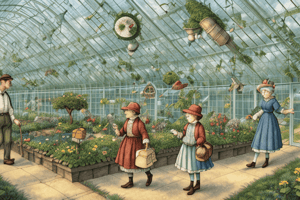Podcast
Questions and Answers
What is the primary cause of global temperatures rising by approximately 1C (1.8F) since the 20th century?
What is the primary cause of global temperatures rising by approximately 1C (1.8F) since the 20th century?
- Volcanic eruptions
- Anthropogenic greenhouse gases (correct)
- Increased solar activity
- Deforestation practices
How has human influence on climate evolved since the Industrial Revolution?
How has human influence on climate evolved since the Industrial Revolution?
- Decreased use of coal, oil, and gas
- Heavy reliance on coal, oil, and gas (correct)
- Reduced carbon dioxide emissions
- Increased reliance on renewable energy sources
What are some short-term impacts of climate change mentioned in the text?
What are some short-term impacts of climate change mentioned in the text?
- Increased heat waves and droughts (correct)
- Extreme weather events
- Melting glaciers
- Rising sea levels
Which activity is NOT mentioned as a factor contributing to climate change in the text?
Which activity is NOT mentioned as a factor contributing to climate change in the text?
What is the potential consequence of continued reliance on fossil fuels according to climate models?
What is the potential consequence of continued reliance on fossil fuels according to climate models?
Which best describes the difference between weather and climate based on the text?
Which best describes the difference between weather and climate based on the text?
What began the human influence on climate according to the text?
What began the human influence on climate according to the text?
Why is understanding human impact on climate essential according to the text?
Why is understanding human impact on climate essential according to the text?
What does the text suggest as a solution to slowing down or reversing the warming trend?
What does the text suggest as a solution to slowing down or reversing the warming trend?
Flashcards are hidden until you start studying
Study Notes
Climate Change Basics
The climate is more than just the weather; it's the average conditions over time in terms of temperature, precipitation, wind patterns, and other atmospheric phenomena across a specific region. Climate change refers to any significant alterations in these long-term norms, typically due to human activities such as burning fossil fuels and deforestation. It can have both short-term impacts like increased heat waves and droughts, as well as long-lasting effects on entire ecosystems.
Human influence on climate began with the Industrial Revolution when society started relying heavily on coal, oil, and gas to fuel industry and transportation, significantly increasing carbon dioxide emissions into Earth’s atmosphere. Since 20th century, global temperatures have risen by approximately 1C (1.8F), primarily driven by anthropogenic greenhouse gases from human activity. This has led to melting glaciers, rising sea levels, extreme weather events, and various ecological changes.
Climate models predict further warming if current trends continue, including potentially catastrophic consequences such as severe food scarcity for billions of people and mass extinctions of many species. However, reducing our reliance on fossil fuels through renewable energy sources could lead to a slowing down or even reversal of this trend. In summary, understanding how humans affect climate is crucial for mitigating its impact now and preventing worse outcomes later.
Studying That Suits You
Use AI to generate personalized quizzes and flashcards to suit your learning preferences.




